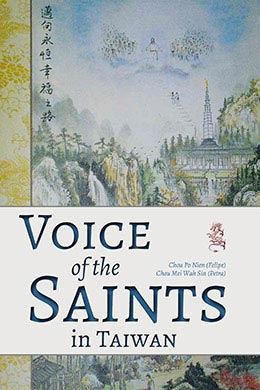Acknowledgments
Po Nien (Felipe) Chou and Petra Chou
Chou Po Nien (Felipe) (周伯彥) and Chou Sin Mei Wah (Petra) (周冼美華), “Acknowledgements,” in Voice of the Saints in Taiwan, ed. Po Nien (Felipe) Chou (周伯彥) and Petra Mei Wah Sin Chou (周冼美華) (Provo, UT: Religious Studies Center; Salt Lake City: Deseret Book, 2017), xi-xiv.
In 2016, the Church in Taiwan commemorated its sixtieth anniversary of the arrival of the first missionaries. As we labored to gather the history of the Church in Taiwan, this really became a “labor of love” that is deeply personal to us. The purpose of this volume was to remember and recognize the contribution of American missionaries and to honor the legacy of early Chinese pioneers who sacrificed much in their devotion and service to help establish the restored gospel of Jesus Christ in Taiwan. In addition, we recognize that understanding the history and culture will allow future missionaries and the rising generation to be more effective in their efforts to build the Church. We believe that those that learn and remember the history and faith of their progenitors will be better prepared to build upon that foundation and better carry the “work of salvation” forward.
Voice of the Saints in Taiwan explores the history of The Church of Jesus Christ of Latter-day Saints in Taiwan, an important part of the vineyard in the Chinese realm. It begins with the first efforts to take the gospel to the Chinese realm, followed by the arrival of LDS missionaries in Taiwan. It explores major Church historical events associated with Taiwan, while also providing depth by sharing personal and faith-promoting stories to strengthen testimonies and deepen conversion. We recognize that there are so many more stories that we did not capture in this book. Nevertheless, it is our hope that it will be a tribute to past missionaries and of value to future missionaries, as well as to the Chinese Saints in Taiwan and elsewhere.
It would be impossible for us to acknowledge everyone by name who has helped us to research, review, write, edit, and format this book. We are grateful for the various people who provided photographs, original records, and other materials and resources that helped to enrich the narrative and compilation of this book. To each and all, we express our sincere gratitude for their contribution to this work. We are grateful for the assistance provided by the Taiwan Service Center, the Church History Library’s open stacks and reading room, and the support from the editors and staff from the Brigham Young University (BYU) Religious Studies Center (RSC). We are thankful for our children for their support and for the many “dates” we had researching at the Church History Library, visiting someone for an oral interview, reviewing countless pages of records, writing this manuscript, or simply enjoying the spirit of the records. Our faith has been strengthened by these sacred experiences.
At times, the adversary seemed intent to hinder this volume from coming forth. Nevertheless, we have also felt heaven’s help to overcome these obstacles. Many times, we felt those from the other side of the veil assisting and directing us to a certain record or individual to discover an important story that needed to be told. It was as if they were calling upon us to tell their story. We would often pray to find a certain record or a particular person, and miraculously these stories and individuals would fall into our path. For any confusion or errors in this book, we apologize and take full responsibility for them. For anything “good or praiseworthy” in this book, we acknowledge all who have helped in this effort, especially our Father in Heaven and his Only Begotten Son, our Lord Jesus Christ. We pray that this humble offering may be acceptable to the Saints in Taiwan and elsewhere.
A Note Concerning Languages, Spellings, and Names
The Chinese language can be rich in meaning and symbolism. However, it can also be difficult and confusing for those unfamiliar with the Chinese language, culture, and customs. In this book, we sought to write in a manner that would merge the needs of both Chinese and English readers. Most importantly, we hope that each and all will seek to view it through the language of the Spirit and the lens of faith.
The various spellings of Chinese names have evolved over the years, partly due to the romanized version and styles used. For example, the Wade-Giles system was used in certain places at various times, while other places utilized the Pin-Yin version. Chinese characters are written in such a way that are foreign to English users, and further confusion is added when the same Chinese character is pronounced and spelled differently between a Mandarin and a Cantonese speaker. In Taiwan, people follow the traditional Chinese method of using their surname followed by their given names. Many women in the Church will also add their husband’s surname in front of their own surname after they are married. We follow these conventions with Chinese names in this book. Finally, over twelve thousand pages of Chinese documents were reviewed for this project by Petra Chou, who also provided translation of these Chinese records when needed. This has been valuable to maintain a degree of consistency with the languages, spellings, and names.
